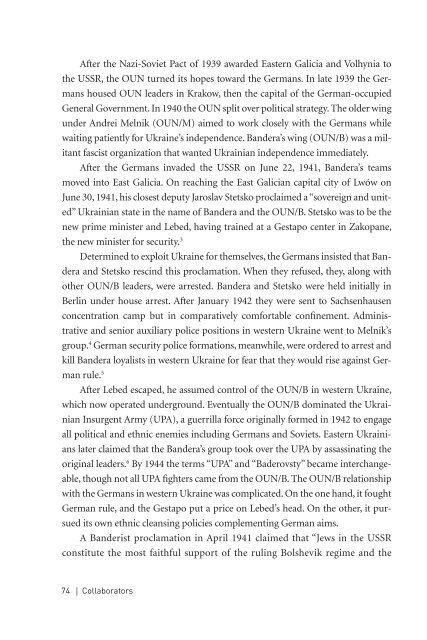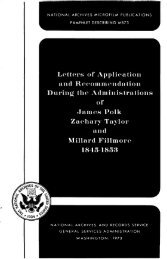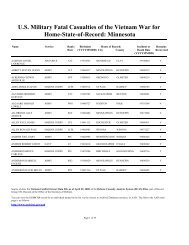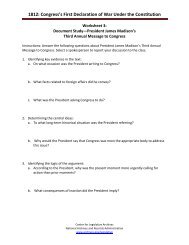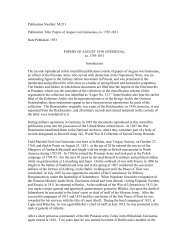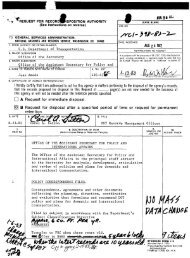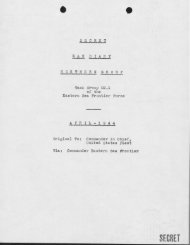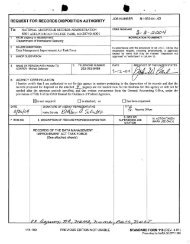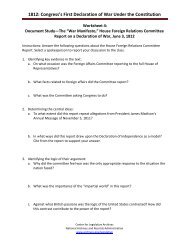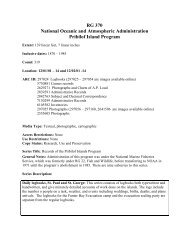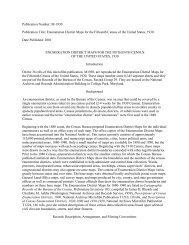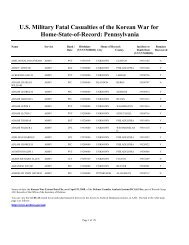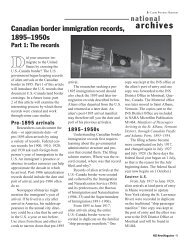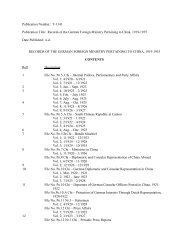HITLER'S SHADOW - National Archives and Records Administration
HITLER'S SHADOW - National Archives and Records Administration
HITLER'S SHADOW - National Archives and Records Administration
Create successful ePaper yourself
Turn your PDF publications into a flip-book with our unique Google optimized e-Paper software.
After the Nazi-Soviet Pact of 1939 awarded Eastern Galicia <strong>and</strong> Volhynia to<br />
the USSR, the OUN turned its hopes toward the Germans. In late 1939 the Germans<br />
housed OUN leaders in Krakow, then the capital of the German-occupied<br />
General Government. In 1940 the OUN split over political strategy. The older wing<br />
under Andrei Melnik (OUN/M) aimed to work closely with the Germans while<br />
waiting patiently for Ukraine’s independence. B<strong>and</strong>era’s wing (OUN/B) was a militant<br />
fascist organization that wanted Ukrainian independence immediately.<br />
After the Germans invaded the USSR on June 22, 1941, B<strong>and</strong>era’s teams<br />
moved into East Galicia. On reaching the East Galician capital city of Lwów on<br />
June 30, 1941, his closest deputy Jaroslav Stetsko proclaimed a “sovereign <strong>and</strong> united”<br />
Ukrainian state in the name of B<strong>and</strong>era <strong>and</strong> the OUN/B. Stetsko was to be the<br />
new prime minister <strong>and</strong> Lebed, having trained at a Gestapo center in Zakopane,<br />
the new minister for security. 3<br />
Determined to exploit Ukraine for themselves, the Germans insisted that B<strong>and</strong>era<br />
<strong>and</strong> Stetsko rescind this proclamation. When they refused, they, along with<br />
other OUN/B leaders, were arrested. B<strong>and</strong>era <strong>and</strong> Stetsko were held initially in<br />
Berlin under house arrest. After January 1942 they were sent to Sachsenhausen<br />
concentration camp but in comparatively comfortable confinement. Administrative<br />
<strong>and</strong> senior auxiliary police positions in western Ukraine went to Melnik’s<br />
group. 4 German security police formations, meanwhile, were ordered to arrest <strong>and</strong><br />
kill B<strong>and</strong>era loyalists in western Ukraine for fear that they would rise against German<br />
rule. 5<br />
After Lebed escaped, he assumed control of the OUN/B in western Ukraine,<br />
which now operated underground. Eventually the OUN/B dominated the Ukrainian<br />
Insurgent Army (UPA), a guerrilla force originally formed in 1942 to engage<br />
all political <strong>and</strong> ethnic enemies including Germans <strong>and</strong> Soviets. Eastern Ukrainians<br />
later claimed that the B<strong>and</strong>era’s group took over the UPA by assassinating the<br />
original leaders. 6 By 1944 the terms “UPA” <strong>and</strong> “Baderovsty” became interchangeable,<br />
though not all UPA fighters came from the OUN/B. The OUN/B relationship<br />
with the Germans in western Ukraine was complicated. On the one h<strong>and</strong>, it fought<br />
German rule, <strong>and</strong> the Gestapo put a price on Lebed’s head. On the other, it pursued<br />
its own ethnic cleansing policies complementing German aims.<br />
A B<strong>and</strong>erist proclamation in April 1941 claimed that “Jews in the USSR<br />
constitute the most faithful support of the ruling Bolshevik regime <strong>and</strong> the<br />
74 | Collaborators


